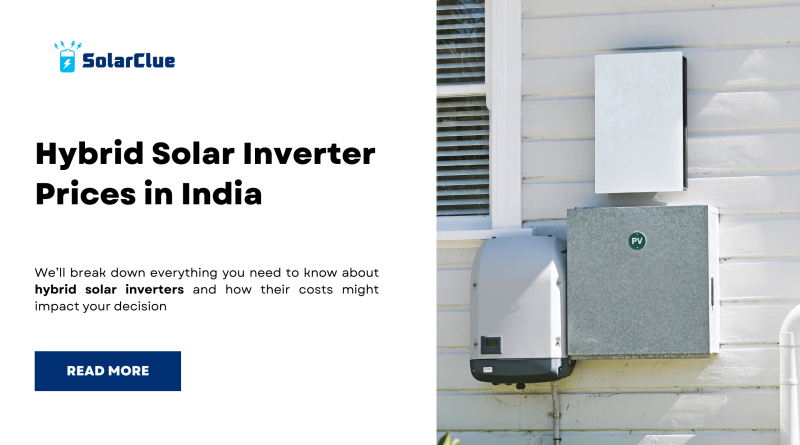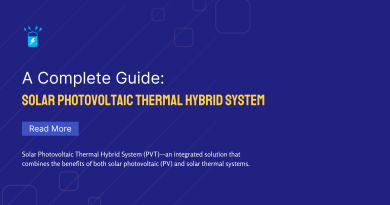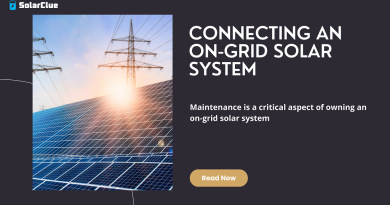Hybrid Solar Inverter Price in India
Hey there! If you’re looking into solar energy for your home or business, you might have come across the term “hybrid solar inverter.” But what does it really mean, and why should you care about its price? In this guide, we’ll break down everything you need to know about hybrid solar inverters and how their costs might impact your decision. By the end, you’ll have a solid understanding of what hybrid solar inverters are, how much they cost in India, and whether they’re worth the investment. Let’s dive in!
Table of Contents
What Is a Hybrid Solar Inverter?
To start with, let’s talk about what a hybrid solar inverter actually is. Imagine you have a solar power system that collects energy from the sun. This energy comes in the form of direct current (DC) electricity. However, most of our household appliances run on alternating current (AC) electricity.
A standard solar inverter converts DC to AC so you can use solar energy in your home. A hybrid solar inverter does all this and more. It’s designed to work with both solar panels and batteries, allowing you to store excess energy for later use. Plus, it can switch between using solar power, battery power, or grid power based on what’s available and most efficient.
So, why is this hybrid feature beneficial? Well, it means you’re less reliant on the grid, can store energy for cloudy days or power outages, and can manage your energy consumption more effectively.
Why Consider a Hybrid Solar Inverter?
There are several reasons why a hybrid solar inverter might be a smart choice for your energy needs:
- Energy Storage: Unlike traditional inverters, hybrid systems let you store excess solar power in batteries. This means you have access to solar energy even when the sun isn’t shining.
- Grid Independence: With a hybrid inverter, you can reduce your dependence on the grid, which can be particularly useful during power cuts or in areas with unreliable electricity supply.
- Efficiency: Hybrid systems can optimize the use of your solar power, battery storage, and grid electricity, potentially lowering your electricity bills.
- Flexibility: They offer flexibility in how you use and manage your energy. You can choose to use solar power during the day, battery power during peak hours, and grid power when needed.
Understanding Hybrid Solar Inverter Prices in India
When it comes to hybrid solar inverters, one of the most important factors to consider is the price. In India, prices can vary based on a range of factors including the brand, capacity, features, and installation costs.
To give you a clearer idea, let’s look at a table comparing different types of hybrid solar inverters and their average prices in India:
| Type of Hybrid Inverter | Capacity | Average Price (INR) |
|---|---|---|
| Small Capacity (1-3 kW) | 1kW to 3kW | 40,000 – 80,000 |
| Medium Capacity (4-6 kW) | 4kW to 6kW | 80,000 – 1,50,000 |
| Large Capacity (7-10 kW) | 7kW to 10kW | 1,50,000 – 2,50,000 |
| High Capacity (Above 10 kW) | Above 10kW | 2,50,000 – 5,00,000+ |
Note: These prices are approximate and can vary based on the brand, additional features, and installation costs.
Factors Affecting Hybrid Solar Inverter Prices
Several factors influence the price of hybrid solar inverters:
- Capacity: The higher the capacity of the inverter, the more expensive it is. Larger inverters are designed to handle more power and typically come with a higher price tag.
- Brand: Well-known brands with a reputation for reliability and efficiency may charge more for their inverters. However, they often come with better support and warranties.
- Features: Inverters with advanced features such as smart monitoring, multiple charge controllers, or enhanced efficiency might cost more.
- Installation Costs: The price of installation can vary based on the complexity of the setup and the region. Some providers include installation in the overall price, while others charge separately.
- Battery Compatibility: If the inverter supports a wide range of battery types or has built-in battery management features, it may be more expensive.
Benefits of Investing in a Hybrid Solar Inverter
Investing in a hybrid solar inverter offers several advantages:
- Long-Term Savings: Although the initial cost might be higher, the ability to store and use solar energy efficiently can lead to significant savings on your electricity bills over time.
- Increased Energy Security: With a hybrid system, you’re less affected by power outages and fluctuations in the grid supply. This can be particularly beneficial in areas with frequent power cuts.
- Environmental Impact: By maximizing the use of renewable energy, you reduce your carbon footprint and contribute to a more sustainable environment.
- Future-Proofing: Hybrid systems are adaptable to future changes in energy needs or technology advancements, making them a good long-term investment.
Comparing Hybrid Solar Inverters with Other Types
When deciding if a hybrid solar inverter is right for you, it’s useful to compare it with other types of inverters:
| Feature | Hybrid Inverter | Grid-Tie Inverter | Off-Grid Inverter |
|---|---|---|---|
| Energy Storage | Yes | No | Yes |
| Grid Dependency | Low | High | Low |
| Efficiency | High | High | Moderate |
| Installation Cost | Moderate to High | Moderate | High |
| Use Case | Home/Business | Grid-Connected Systems | Remote/Isolated Areas |
Installation Tips for Hybrid Solar Inverters
If you decide to go ahead with a hybrid solar inverter, here are some tips for a successful installation:
- Hire a Professional: Installing a hybrid solar inverter involves electrical work that should be handled by a qualified technician to ensure safety and compliance with local regulations.
- Choose the Right Location: Install the inverter in a cool, dry, and well-ventilated area. Avoid direct sunlight and extreme temperatures to enhance its performance and longevity.
- Plan for Battery Storage: If you’re adding batteries to your system, plan their placement and ensure they’re compatible with your inverter.
- Understand the Warranty: Make sure you understand the terms of the warranty for both the inverter and the installation. This will help protect your investment in case of any issues.
Conclusion
So, there you have it—a comprehensive overview of hybrid solar inverter prices in India! Understanding what a hybrid solar inverter is and how it can benefit you is crucial when considering a solar power system. While the initial investment might seem high, the long-term savings, energy security, and environmental benefits can make it a worthwhile choice.
If you’re ready to explore your options, remember to compare different models, consider your specific needs, and consult with professionals to get the best setup for your situation. Solar power can be a fantastic way to reduce your energy bills and your carbon footprint, and a hybrid solar inverter is a key piece of that puzzle.
Visit SolarClue® to see the best Solar Inverters. SolarClue® actively sells solar energy products at discounts of up to 50% on its online marketplace.
FAQs About Hybrid Solar Inverters
1. What is the main advantage of a hybrid solar inverter?
The main advantage is its ability to store solar energy in batteries, allowing you to use it even when the sun isn’t shining. It also helps you manage energy more efficiently by switching between solar, battery, and grid power.
2. Are hybrid solar inverters more expensive than traditional inverters?
Yes, hybrid solar inverters are generally more expensive due to their advanced features and the ability to work with battery storage. However, they can offer long-term savings and greater energy independence.
3. How long does a hybrid solar inverter typically last?
With proper maintenance, a hybrid solar inverter can last between 5 to 10 years. Regular checks and servicing can help extend its lifespan.
4. Can I install a hybrid solar inverter myself?
It’s recommended to have a professional install your hybrid solar inverter to ensure it’s done correctly and safely. Incorrect installation can lead to performance issues or safety hazards.
5. What size hybrid solar inverter do I need for my home?
The size of the inverter depends on your energy needs and the capacity of your solar panel system. Consult with a solar expert to determine the right size based on your specific requirements.




Looking to invest in a hybrid solar inverter for your home or business? Understanding the hybrid solar inverter price in India is key to making a smart, long-term energy decision. At Feston Sev, we bring you high-efficiency, reliable hybrid inverters at competitive prices, ensuring you get the best value for your investment.
Whether you’re aiming for uninterrupted power supply, reduced electricity bills, or a greener lifestyle, our hybrid solar inverter solutions are designed to meet diverse needs with advanced technology and long-lasting performance. With Feston Sev, you’re not just buying a product — you’re choosing trusted quality and service.
Visit https://festonsev.com or call us at 93848 13428 to explore our latest models and get a quote today!
Hi,
Thank you for sharing details about Feston Sev’s hybrid solar inverters. It’s great to see innovative and efficient solutions being offered at competitive prices. We appreciate the information and will definitely keep Feston Sev in mind for readers exploring smart solar investments.
Thanks!